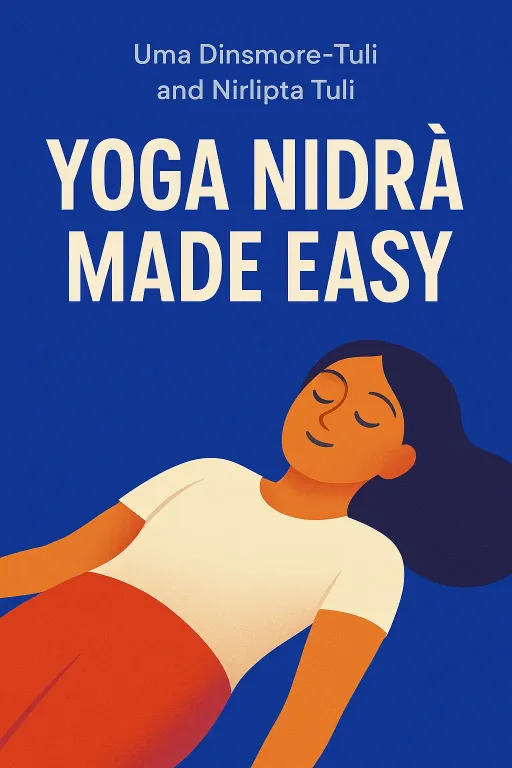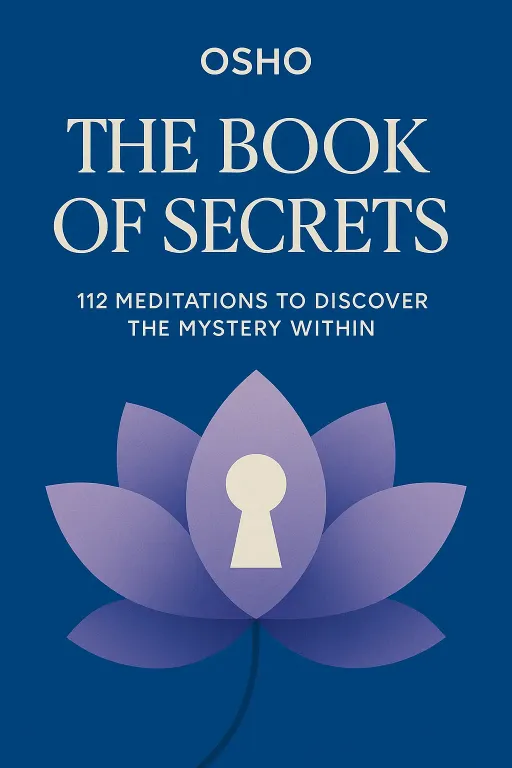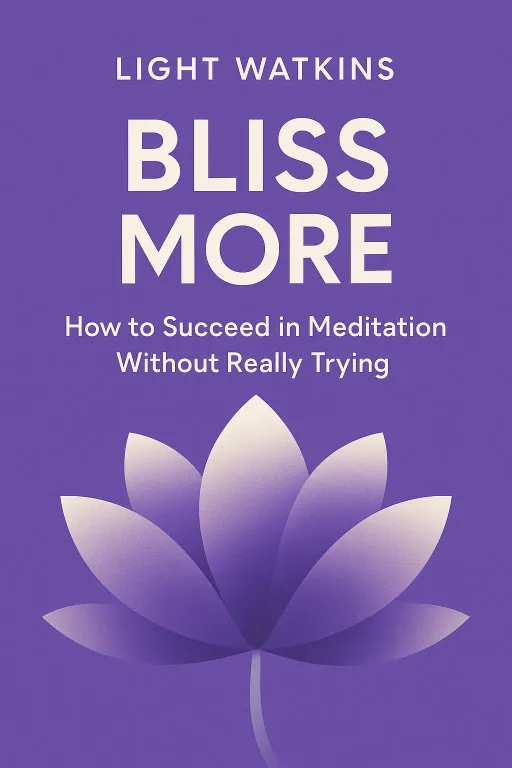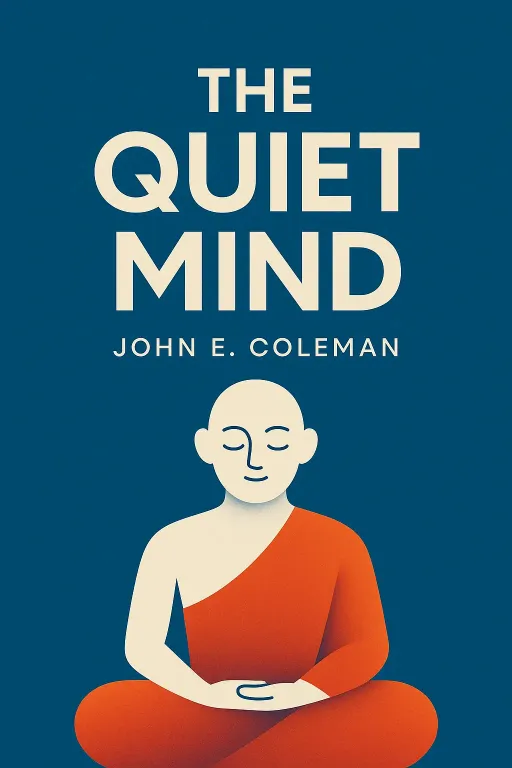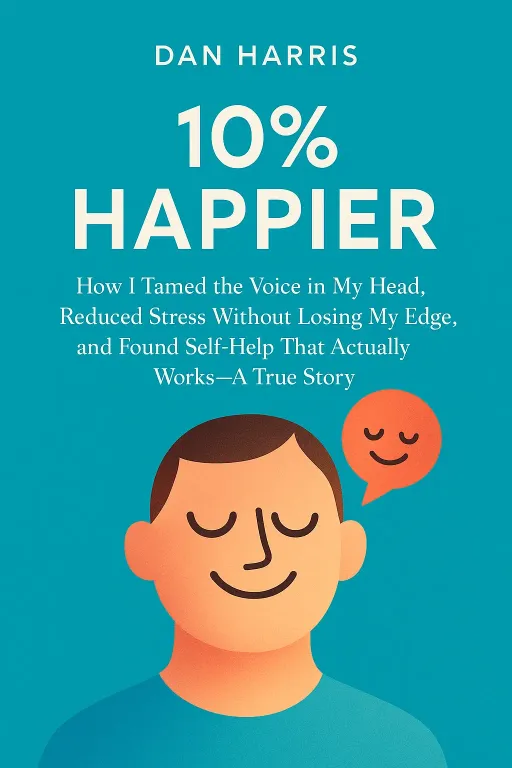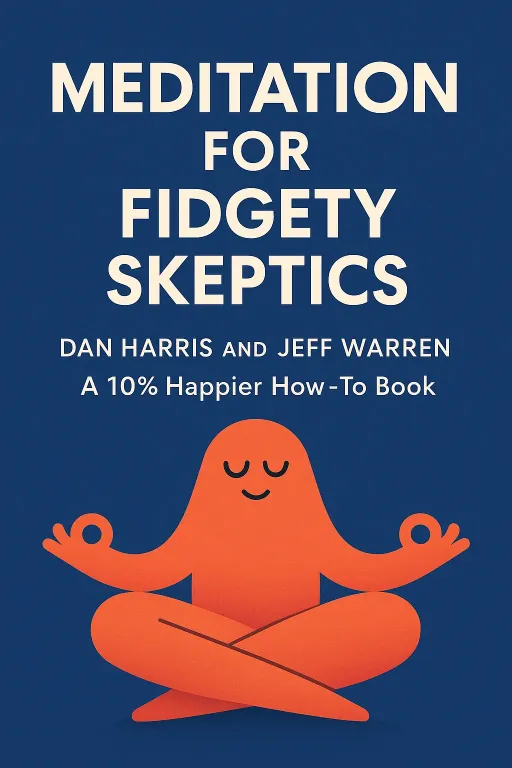
Meditation for Fidgety Skeptics
11 minA 10% Happier How-To Book
Introduction
Narrator: Imagine being a news anchor, live on national television, reading the headlines to millions of viewers. Suddenly, your lungs seize up, your vision blurs, and the words on the teleprompter become an indecipherable jumble. You can't speak. You can't breathe. This isn't a hypothetical scenario; it's exactly what happened to ABC News anchor Dan Harris in 2004. This on-air panic attack, fueled by years of undiagnosed depression and self-medication, sent him on a reluctant journey into a world he once dismissed as absurd: meditation. In his book, Meditation for Fidgety Skeptics, co-authored with meditation teacher Jeff Warren, Harris confronts the common, practical, and often humorous obstacles that stop people from trying a practice that science increasingly shows can rewire the brain for the better.
The Goal Isn't an Empty Mind, It's a Focused One
Key Insight 1
Narrator: The single biggest myth that derails aspiring meditators is the belief that they must "clear their mind." When Dan Harris first tried to guide his Good Morning America colleagues through a meditation, their immediate feedback was one of failure. His co-host, Paula Faris, voiced a common frustration, saying, "I’ve always thought it was clearing your brain of everything." This misconception leads people to conclude, "I can't do this," because thoughts inevitably arise.
The authors argue this is a fundamental misunderstanding of the practice. Meditation isn't about stopping thoughts; it's about changing your relationship to them. The actual exercise is simple: you focus on your breath, and when your mind wanders—which it will—you gently notice the distraction and return your attention to the breath. That moment of noticing is the "bicep curl for your brain." It's a victory, not a failure. The goal is not to achieve a state of perfect mental silence, but to become less yanked around by the constant chatter of the "voice in your head," thereby training the muscle of focus.
One Minute Counts
Key Insight 2
Narrator: The most common excuse for not meditating is a lack of time. In a world of packed schedules and endless to-do lists, the idea of adding another daily task feels overwhelming. The book tackles this head-on, arguing that consistency trumps duration. During an interview on Elvis Duran's popular morning radio show, a caller asked how much time meditation really takes. Harris’s answer was simple: "I think one minute counts."
This isn't just a platitude; it's a strategic starting point. The authors explain that the goal is to build a sustainable habit, and starting with an impossibly small commitment—just one minute, or even ten deep breaths—makes it much harder to fail. This small, achievable goal helps anchor the practice into one's daily routine. Once the habit is established, the duration can naturally extend. The book emphasizes that meditation is best used as a preventative measure, like exercise, not just a tool for acute crises. As one expert quoted in the book says, "Everyone should meditate once a day. And if you don’t have time to meditate, then you should do it twice a day."
The Stigma is Fading, But Can Be Finessed
Key Insight 3
Narrator: For many, a major hurdle is the fear of being seen as "weird." This was a concern for Congressman Tim Ryan, who represents a rust-belt district in Ohio. When he began advocating for mindfulness to cope with political burnout, he faced ridicule. The authors themselves encountered this when Shenandoah National Park officials canceled a planned interview, fearing that showing park rangers meditating would be a strange endorsement.
However, the book argues this stigma is rapidly fading. To counter lingering skepticism, the authors suggest strategic communication. At the Virginia Military Institute (VMI), for example, instructors successfully introduced meditation to cadets by framing it not as a "soft, fluffy thing," but as a rigorous mental training to face stress head-on. They highlighted the science showing its benefits for soldiers and pointed to high-performers who meditate. By presenting it as a tool for resilience and performance enhancement, they made it palatable in a culture that values strength and discipline.
Self-Care Isn't Selfish, It's Necessary
Key Insight 4
Narrator: Another powerful objection is the feeling that meditation is self-indulgent. Leslie Wandemberg, a speech-language pathologist and mother interviewed for the book, captured this perfectly. She explained that whenever she tried to take five minutes to meditate, she was flooded with guilt, thinking of all the other things she "should" be doing for her family. This feeling is especially common among caregivers.
The book refutes this by comparing self-care to the safety instructions on an airplane: you must put on your own oxygen mask before helping others. Neglecting your own well-being doesn't make you a martyr; it makes you less effective and more prone to burnout and resentment. The authors introduce the Buddhist parable of the "second arrow." The first arrow is the inevitable pain of life. The second arrow is the suffering we inflict on ourselves through negative self-talk and judgment. Self-compassion, which meditation can cultivate, is the skill of not firing that second arrow. It's not about being selfish; it's about ensuring you have the inner resources to show up fully for others.
You Can't Avoid Your Feelings, But You Can Learn to Navigate Them
Key Insight 5
Narrator: A deep-seated fear for many is that sitting quietly will open a Pandora's box of difficult emotions. A study from the University of Virginia highlighted this aversion dramatically: when left alone in a room for fifteen minutes, two-thirds of the male participants chose to give themselves an electric shock rather than just sit with their thoughts.
The book argues that while meditation can bring difficult emotions to the surface, it also provides the tools to work with them proactively. Instead of letting emotions hijack you, you can learn to observe them with clarity. The authors introduce the RAIN technique: Recognize the emotion, Accept its presence without judgment, Investigate how it feels in your body, and practice Non-identification, realizing that you are not your emotion. This process allows you to get to know your inner patterns without being controlled by them, gradually making them less insistent over time.
True Happiness Sharpens Your Edge, It Doesn't Dull It
Key Insight 6
Narrator: In competitive fields, there's a pervasive fear that becoming happier or calmer will lead to complacency and a loss of one's "edge." Fox News anchor Brian Kilmeade articulated this using an analogy from Rocky III, where a successful and happy Rocky gets soft and loses to the hungry challenger, Clubber Lang. This fear was also voiced by Sergeant Raj Johnson, a police officer in Tempe, Arizona, who worried that meditation would slow his reaction time in life-or-death situations.
The book dismantles this myth, arguing that mindfulness enhances, rather than erodes, your edge. By reducing the mental energy wasted on useless worry—by repeatedly asking the question "Is this useful?"—meditation frees up bandwidth for focus and clarity. It allows you to respond to situations wisely rather than reacting blindly from a place of anger or fear. For Sergeant Johnson and his fellow officers, meditation was reframed as mental training that helps them reset after stressful events, make better decisions under pressure, and ultimately be more effective at their jobs.
Conclusion
Narrator: The central, transformative idea of Meditation for Fidgety Skeptics is that happiness is not a random state of being that befalls the lucky; it is a skill. Like training a muscle in the gym, qualities like calm, focus, and compassion can be intentionally cultivated through the simple, secular practice of mindfulness. The journey isn't about achieving perfection or banishing all negative thoughts, but about fundamentally changing your relationship with the voice in your head.
The book leaves us with a powerful challenge to our own inertia. It asks us to consider that perhaps the biggest obstacle isn't our busy mind, our lack of time, or what others might think. Perhaps the biggest obstacle is simply the reluctance to begin. What might change if you decided, just for today, that one minute counts?
